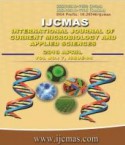


 National Academy of Agricultural Sciences (NAAS)
National Academy of Agricultural Sciences (NAAS)

|
PRINT ISSN : 2319-7692
Online ISSN : 2319-7706 Issues : 12 per year Publisher : Excellent Publishers Email : editorijcmas@gmail.com / submit@ijcmas.com Editor-in-chief: Dr.M.Prakash Index Copernicus ICV 2018: 95.39 NAAS RATING 2020: 5.38 |
In the present study dhokla was prepared by natural and probiotic (L. acidophilus) fermentation with the supplementation of 10, 20 and 30 per cent okara powder. Results of organoleptic evaluation indicated that both naturally and probiotic fermented dhokla supplemented with 10 per cent okara powder were found most acceptable and ‘liked moderately’ by the judges. Mean scores of all the sensory attributes deceased significantly (P<0.05) as the level of okara powder supplementation increased from 10 to 30 per cent in both naturally and probiotic fermented dhokla. Hardness of both naturally and probiotic fermented dhokla increased significantly (P<0.05) as the level of okara powder supplementation increased from 10 to 30 per cent. The pH of naturally fermented batters of dhokla were significantly (P<0.05) lower as compared to their respective probiotic fermented counterparts. In both natural and probiotic fermentation, significant (P<0.05) difference was observed in between the titratable acidity of without okara and with okara powder supplemented batters dhokla. The counts of lactobacilli i.e. 7.2×1010 cfu/ml in control and 6.8×1010 cfu/ml in 10 per cent okara powder supplemented dhokla batters were maximum after 8 h of natural fermentation, followed by yeast cells i.e. 3.3×105 and 3.8×105 cfu/ml in control and 10 per cent okara powder supplemented dhokla batters, respectively. Whereas, the number of lactobacilli cells increased to 6.1×1010 in control and 6.3×1010 in okara powder (10%) supplemented and probiotic fermented dhokla batters after 8 h. A significant (P<0.05) decrease was brought about in crude protein, fat and crude fibre contents of naturally and probiotic fermented without okara dhokla over unfermented control. Supplementation of 10 per cent okara powder in dhokla whether fermented naturally or with probiotic microorganism significantly (P<0.05) increased the protein, fat, ash and crude fibre content.
 |
 |
 |
 |
 |